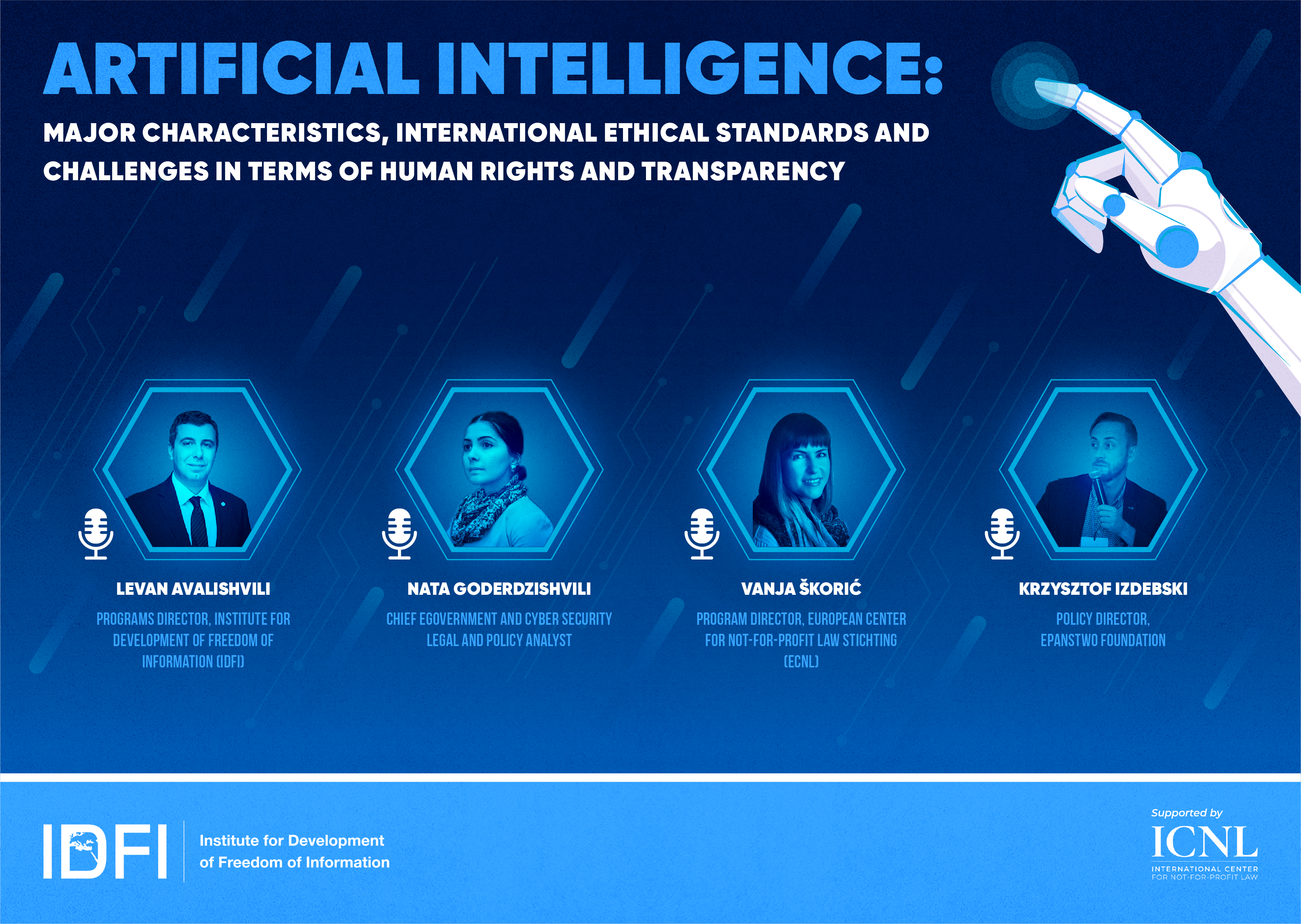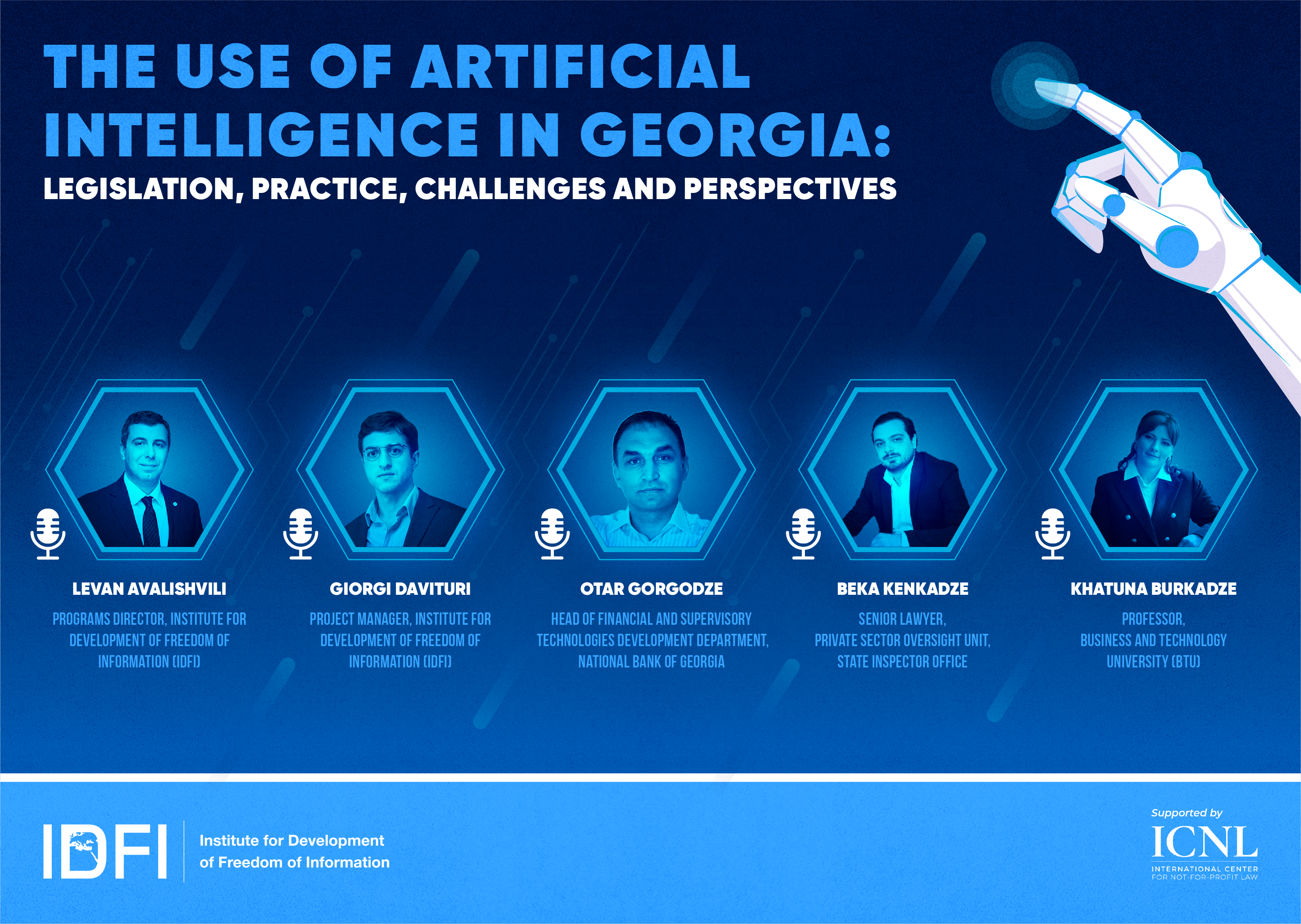


On February 18, IDFI held an online conference entitled, Artificial Intelligence: International Trends and Georgia. The conference aimed to explore international tendencies, standards, transparency, and ethical principles of using artificial intelligence, as well as particular cases of using artificial intelligence in Georgia’s public sector, and their implications for the right to privacy in the country. To this end, the event intended to foster discussion with the participation of experts, human rights activists, the representatives of civil society, the public sector, the tech community, academia, both local and international organizations working on technologies, human rights, and artificial intelligence on the following issues:
- The definition and major concepts of artificial intelligence;
- Artificial intelligence in the public sector: benefits, challenges, and prospects;
- Ethical standards and norms in the use of artificial intelligence;
- Artificial intelligence and Georgia: perspectives of different stakeholders.
In addition, IDFI's two recently prepared studies on international standards and the use of artificial intelligence in Georgia’s public sector were presented during the conference.
The online conference was held with the financial support of the International Center for Nonprofit Law (ICNL).
The conference consisted of two panels. The conference was opened and moderated by Levan Avalishvili, Programs Director of IDFI.
The topic of the first panel of the conference was - Artificial Intelligence: Key features, International Ethical Standards, and Challenges in Terms of Human Rights and Transparency.
The panel speakers included:
- Nata Goderdzishvili - Chief eGovernment and Cybersecurity Legal and Policy Analyst
- Vanja Skoric - Program Director, European Center for Not-For-Profit Law (ECNL)
- Krzysztof Izdebski - Policy Director, ePanstwo Foundation

At the beginning of the panel, Nata Goderdzishvili, Chief eGovernment and Cybersecurity Legal and Policy Analyst presented IDFI's new study - Artificial Intelligence: Meaning, International Standards, Ethical Norms, Recommendations and Conclusions. Nata reviewed the key issues and findings discussed in the study, as well as the general concept of artificial intelligence, international legal practice, and current tendencies.
The panel was continued by ECNL Program Director, Vanja Skoric, who noted that the issue of artificial intelligence is relevant both globally and regionally. She also stressed the importance of ensuring the balance between technology development and human rights. Ms. Skoric also spoke about the importance of integrating human rights, democratic principles, and the rule of law into the artificial intelligence development ecosystem.
Finally, Krzysztof Izdebski, Policy Director of the Polish non-governmental organization, ePanstwo Foundation, spoke about the importance of other automated systems and algorithms along with artificial intelligence. He highlighted the scarcity of external audits, which is often caused by attempts to protect commercial secrets, and talked about ways to address this challenge.
During the panel, the speakers noted that civic engagement is an important and inevitable element in the policy-making process. The panelist also expressed the view that some representatives of the civil society avoid discussing the issues related to artificial intelligence and other high-tech topics due to the lack of technical knowledge and expertise. Therefore, it is important for civil society to overcome this barrier, as, despite the technical particularities, high-tech innovations concern human rights and other fundamental values. The speakers added that they may not be able to read / decrypt the code of individual software, but it is important to know and evaluate the performance of this system. The panel also stressed the importance of greater involvement of the public, for which the government should work towards raising public awareness on artificial intelligence issues.
At the end of the panel, the speakers answered questions submitted by the online participants, most of which related to the transparency of the algorithms introduced by the Polish state, the importance of the definition of artificial intelligence, and Georgia's international commitments to the development of artificial intelligence.
The second panel of the conference focused on the Use of Artificial Intelligence in Georgia: Legislation, Practice, Challenges, and Perspectives. The participants of the panel were:
- Giorgi Davituri - Project Manager, Institute for Development of Freedom of Information (IDFI)
- Otar Gorgodze - Head of Financial and Supervisory Technology Development Department, National Bank of Georgia
- Beka Kenkadze - Senior Lawyer, Private Sector Oversight Unit, State Inspector’s Service
- Khatuna Burkadze - Professor, University of Business and Technology (BTU)

The first speaker of the panel, Giorgi Davituri, presented the second study prepared by IDFI ("Use of Artificial Intelligence Systems in Georgia - Legislation and Practice"), reviewed the main findings, and spoke about the practical and legal aspects of artificial intelligence in the Georgian public sector.
The discussion was continued by the representative of the National Bank, Otar Gorgodze, who spoke about the decree of the President of the National Bank, which is one of the rare legal acts in the Georgian legislation, that mentions the term "Artificial Intelligence". The potential of artificial intelligence in the financial sector and its importance in terms of access to finance was also discussed. In his view, the use of artificial intelligence in the financial sector contributes to reducing banking costs and, consequently, the cost of services.
Beka Kenkadze, the representative of the State Inspector's Service, spoke about the potential risks arising from the processing of personal data by artificial intelligence and the importance of studying them. He also discussed the draft law on personal data submitted to the Parliament by the State Inspector's Service, which provides for new standards and introduces new definitions in the Georgian legislation. Beka Kenkadze stated that the State Inspector's Service is willing to provide consultations for the private sector representatives and developers in the process of developing various programs.
Finally, Khatuna Burkadze spoke about the importance of developing automated services and the need for the state to establish a common strategic vision in this regard. She also stressed the importance of raising public awareness.
At the end of the panel, the speakers answered questions submitted by the participants of the online conference, discussed the major recommendations from IDFI’s study, the role of artificial intelligence in the municipalities, and examples of potential risks of algorithms of artificial intelligence systems. It was noted during the discussion that it is important to have transparent rules and a unified vision for overseeing the process of developing artificial intelligence and that the process of strategy development should be inclusive, and the public sector, as well as the academia, the private and civic sectors, should be actively engaged in it.
See the Conference Panel Recordings:
Panel II: The Use of Artificial Intelligence in Georgia: Legislation, Practice, Challenges, and Prospects